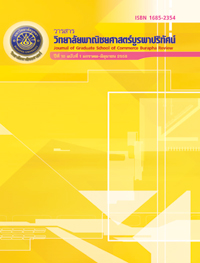รูปแบบวัฒนธรรมพี่เลี้ยงที่เหมาะสมในการพัฒนาองค์การในประเทศไทย
Main Article Content
Abstract
งานวิจัยฉบับนี้มีวัตถุประสงค์ 1) เพื่อศึกษาวิจัยรูปแบบระบบปฏิบัติการพี่เลี้ยงที่ดำเนินการจนเป็นวัฒนธรรม พี่เลี้ยงที่เหมาะสมกับบริบทโรงงานอุตสาหกรรม และ 2) เพื่อพัฒนาโปรแกรมพี่เลี้ยงและวัฒนธรรมพี่เลี้ยงที่เหมาะสม และนำไปใช้ได้จริงในโรงงานอุตสาหกรรมอาหาร โดยการวิจัยเชิงคุณภาพด้วยการสัมภาษณ์เชิงลึกผู้เชี่ยวชาญ ที่ได้นำโปรแกรมพี่เลี้ยงมาใช้แล้วไม่น้อยกว่า 5 ปี ซึ่งเป็นกลุ่มผู้ให้ข้อมูลหลักจำนวน 22 คน และการประชุม focus group ของผู้เชี่ยวชาญที่นำระบบพี่เลี้ยงมาใช้ในประเทศไทย และ/หรือ ผู้บริหารระดับสูงขององค์การที่นำระบบพี่เลี้ยงมาใช้ เมื่อได้รูปแบบวัฒนธรรมพี่เลี้ยงที่เหมาะสมในการพัฒนาองค์การแล้ว จึงนำมาประยุกต์ใช้ในการปฏิบัติจริงในองค์การ เป็นเวลา 3 เดือน พร้อมทั้งทำการประเมินผลด้วยแบบตรวจประเมินวัฒนธรรมพี่เลี้ยง (Mentoring culture audit) และ แบบประเมิน CIPP Evaluation model เพื่อประเมินความเป็นไปได้
ผลการวิเคราะห์ข้อมูลพบว่า รูปแบบวัฒนธรรมพี่เลี้ยงที่เหมาะสมในการพัฒนาองค์การที่นำมาประยุกต์ใช้ สามารถทำให้โปรแกรมพี่เลี้ยงที่ใช้อยู่มีประสิทธิภาพเพิ่มขึ้นอย่างชัดเจน และมีความเป็นไปได้สูงที่จะทำให้วัฒนธรรม พี่เลี้ยงมีความกลมกลืนเป็นส่วนหนึ่งของวัฒนธรรมถาวรขององค์การต่อไปจึงสรุปได้ว่าวัฒนธรรมพี่เลี้ยงที่เหมาะสม ในการพัฒนาองค์การควรประกอบด้วย 1) มีนโยบายการพัฒนาบุคคลด้วยระบบพี่เลี้ยง 2) มีระบบการฝึกทักษะทางเทคนิค ด้วยระบบพี่เลี้ยง 3) มีระบบการประเมินผลการปฏิบัติงานที่ดี 4) มีระบบการให้รางวัลที่เหมาะสม 5) มีการสร้าง ความสัมพันธ์และไว้วางใจกัน 6) มีการส่งเสริมให้พนักงานได้ฝึกทักษะด้านอื่นๆที่ไม่ใช่ทักษะเฉพาะตำแหน่งเพิ่มเติม 7) มีการส่งเสริมให้ดาวเด่นเจริญเติบโต และ 8) มีการส่งเสริมให้เกิดสังคมแห่งการเรียนรู้
APPROPRIATE MENTORING CULTURE MODEL IN ORGANIZATION DEVELOPMENT IN THAILAND
Kriengsak Theppadungporn and Issara Suwannabon
Graduate School of Commerce, Burapha University, Chon Buri 20131, Thailand
The purposes of this research are 1) to investigate the mentoring process in industrial business that has been practiced and become mentoring culture and 2) to develop the appropriate mentoring culture model that can be practically used in food manufacturing industry. The qualitative were used by in-depth interviews to 22 experts who have experience in using mentoring program at least 5 years. The experts and specialists who have experience in using mentoring in organizations in Thailand are asked to participate in the focus group. Then the results are used as the fundamental data and the information is then Then to consider and summarize the appropriate model of mentoring culture to develop the organization in Thailand contexts. Then the results are analyzed and synthesized to be applied in the real work practices for 3 months. The evaluation of changes are done both in terms of the mentoring culture audit and CIPP evaluation model to evaluate the feasibility.
The research results show that when the appropriate mentoring culture model has been practically applied in organization, the effectiveness of mentoring program has vastly improved. The appropriate mentoring culture model consists of: 1) human resource development policy that focuses on mentoring approach, 2) technical skill training by using mentoring process, 3) effective standard of performance appraisal policy, 4) appropriate performance reward system, 5) relationship and trustworthy working atmosphere, 6) opportunity for employee to be trained on other working skills, 7) advancement opportunity for talents, 8) promotion of a learning society.
Article Details
The owner of the article does not copy or violate any of its copyright. If any copyright infringement occurs or prosecution, in any case, the Editorial Board is not involved in all the rights to the owner of the article to be performed.


